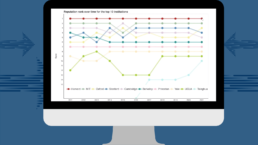The latest THE World Reputation Rankings have been published, with positive performances from many W100 members, and perhaps the first evidence that the response of universities to the Covid-19 pandemic is impacting global profile.
Nineteen W100 members improved or maintained their ranking compared to last year, although ten institutions saw their scores fall. THE World Reputation Rankings only cover the top 200 in the world, so some members are excluded.
These rankings are infamous for rarely changing at the top end, reflecting the power of the ‘superbrands’. However, the University of Oxford rose to 3rd place (from 5th), perhaps reflecting the high profile of the university around its association with the Astra Zeneca Covid-19 vaccine.
It was also notable that Tsinghua University entered the top ten, the first time a Chinese institution has joined the top table, which has been dominated by the US and the UK.
However, Harvard is once again the leading university in the rankings table and the top ten largely remains unchanged, a pattern going back many years.

The THE Reputation Rankings are based on the results for the academic Reputation Survey, undertaken with around 11000 published faculty at global universities who are asked to nominate the best institutions in their fields.
The methodology for constructing this league table has long been debated. The institutions that receives the most ‘votes’ (which has always been Harvard since the rankings were launched in 2011) are given a score of 100 in the table. The scores for all other institutions in the table are expressed as a percentage of this institution’s score.
According to THE, this scoring system, which differs from that used in the THE World University Rankings which also use data from the Academic Reputation Survey, is intended to ‘give a clearer and more meaningful perspective on the reputation data in isolation’.
However, this means that, once you get below the top 50 universities in the table, the differences in scoring are (very) marginal – and indeed, THE groups institutions together at this point, rather than giving individual scores.
It can also mean that, due to small differences in votes, universities can drop out of the top 200 in a given year; for example, W100 member McMaster University, which has seen consistent gains in the World University Rankings over recent years, does not feature in the Reputation Rankings this year.
However, members, Amsterdam and Aarhus saw notable rises.
The impact of the pandemic on global university reputation will be explored further in the annual World 100 Network research project which will be published shortly.

